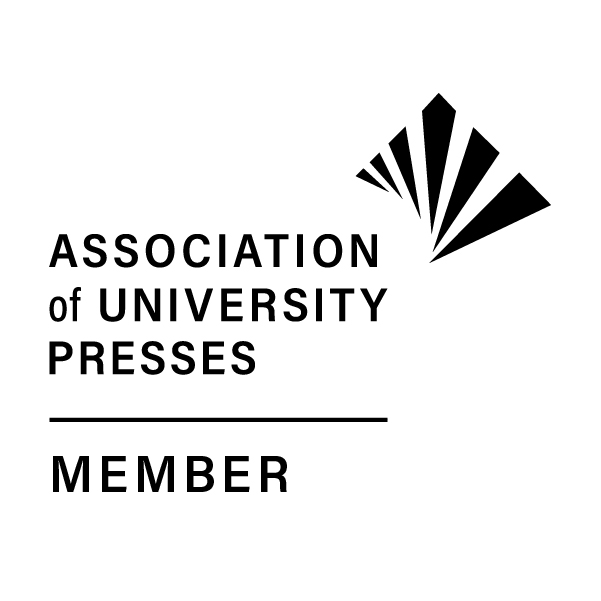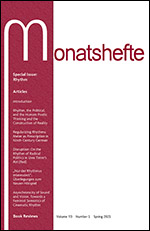|


|

Subscribe
Read the Journal Online
Submission Guidelines
Editorial Board
Receive Email Updates
Advertise in Monatshefte
Indexes/Abstracts
Current Issue TOC
Back Issues TOC
Monatshefte 2022 Subscription Rates
Institutions:
print & online $271
online only $233
Individuals:
print & online $103
online only $86
Non U.S. Postage (no postage charges for online-only subscriptions)
Airmail: add $40/yr.
Canadian Subscribers: add 5% GST. |
Monatshefte
Volume 100, Number 1, Spring 2008 Table of Contents
From the Editor
Greetings from the Profession
(Re)Readings—New Readings / (Wieder)Gelesen—Neu Gelesen
Käte Hamburger, Die Logik der Dichtung
Horst Turk
Käte Hamburger
Caroline Domenghino
Käte Hamburger’s Logik der Dichtung in Contemporary Narrative Theory
Articles
Oliver Simons
Botschaft oder Störung? Eine Diskursgeschichte des “Rauschens” in der Literatur um 1800
Abstract:
Never was so much written about Rauschen than around 1800. This essay reconstructs the varied semantics of Rauschen in philosophical and literary texts of Kant, Herder, and Hegel, Goethe, Eichendorff, and Müller. It shows that Rauschen was both understood as a disturbance, but also as an ideal message. While Kant, exemplarily, seems to occlude sound from his investigations and does not even perceive sublime waterfalls as acoustical events, the cosmos is for Herder a sound-space; in his essay on the origin of language he describes Rauschen as an originary, prelinguistic phenomenon. Whoever hears Rauschen is closer to the origins of language and can hear ideal messages. Even in lyric texts such as Goethe’s poem “Der Fischer,” Rauschen becomes an asemantic linguistic ideal. As this essay likewise demonstrates, the motif of Rauschen already undergoes a transformation in late Romanticism. In Eichendorff, for example, Rauschen no longer portends an ideal message but instead connotes a lack of meaning, sensory confusion, and the loss of those sources with which lyric poetry once thought itself bound. Even the song cycles of Müller are an example of that other discourse of Rauschen: that of the disruption with which Rauschen is still associated today. (OS)
James P. Martin
Reading Race in Kleist’s “Die Verlobung in St. Domingo”
Abstract:
This article applies semiotic and anthropological approaches to elucidate the function of race within one of Kleist’s most controversial novellas. The analysis reveals how skin color functions as a sign within a cultural system that ultimately establishes a hierarchy of moral values. Previous scholarship has been divided on Kleist’s relation to racist assumptions prevalent in European colonial discourse and Enlightenment philosophy. Rather than attempting to establish the author’s racial opinions from an intentionally ambivalent text, this study focuses on the context in which skin color functions as a sign. By examining the intersection of cultural and semiotic systems, race is revealed as a fluid and unstable construct within Kleist’s novella. (JPM)
Andreas B. Kilcher
Ha-Gila. Hebräische und jiddische Schiller-Übersetzungen im 19. Jahrhundert
Abstract:
The Weimar Classicism author Friedrich Schiller became a role model for Jewish modernity during the nineteenth century not only for the German but also for the East European Jews in the stetl from Hungary to Galicia and Russia. This article points out the outstanding impact of Schiller’s work for the formation of Jewish modernity. The “Ode to Joy” in its numerous Hebrew and Jiddish translations serves as a paradigmatic example. With this example and the overall Jewish reception of Schiller the cultural dynamic of Jewish modernity becomes more discernible. Originally it was driven by the almost unshakable optimism that Schiller’s ideas of Bildung, freedom, and universal solidarity could indeed become reality. Part of this dynamic was, however, that at the end of the nineteenth, and all the more facing the catastrophe of the twentieth century, doubts arose about the project of a German-Jewish culture, first perceiving its limitations and finally experiencing its failure. (ABK; in German)
Julia Mansour
“Auf dem goldenen Grund aller Finsternis”—Erkenntnis-, Handlungs- und Seinsgründe in Hermann Brochs Die Verzauberung
Abstract:
Hermann Broch’s Die Verzauberung (The Spell) embodies a demanding philosophical content, which is not solely expressed in the narrator’s comments, but is additionally thematized through the protagonists’ actions. Broch’s narrator, tragically confronted with various limitations of human cognitive capacities, tries to develop an ‘epistemic ethics,’ which aims at reconciling human rational and intuitive capacities. With the help of the intricate semantics of “Grund” (German for soil, foundation, reason), Broch thus addresses three interrelated philosophical problems: the foundations of knowledge, action, and existence. (JM; in German)
Marcus Bullock
Shocked Silences: Alfred Andersch, Walter Benjamin, Ludwig Wittgenstein
Abstract:
In all his works, though especially in Die Kirschen der Freiheit, Alfred Andersch explores the difference between rhetorical power in the public and the private domain. In that early work, he describes how he retreated from the public sphere in order to generate a fragment of language that signals a moment of individual spontaneity, a momentary passage of freedom. In identifying the quality of such an instant and the form of expression that articulates it, he also generates the basis of a resistance to all the forms of discourse that endeavor to enthrall their speakers by inscribing them within an ultimate enclosure of meaning. That resistance applies initially, of course, to the depredations of political seduction, but its incisive critical line also exposes common weaknesses drawn on the horizon of rhetorical power in the otherwise so different, though equally attractive and impressive, intellectual achievements of Walter Benjamin and Ludwig Wittgenstein. (MB)
Book Reviews
Adam, Thomas and Ruth Gross, eds., Traveling between Worlds: German-American Encounters (Cora Lee Kluge)
Braun, Theodore E. D. and John B. Radner, eds., The Lisbon Earthquake of 1755: Representations and Reactions (Christoph Weber)
Cornejo, Renata, Das Dilemma des weiblichen Ich (Brigitte E. Jirku)
Dingeldey, Erika, Luftzug hinter Samtportieren. Versuch über E. Marlitt (Helga Druxes)
Eickenrodt, Sabine, Augen-Spiel. Jean Pauls optische Metaphorik der Unsterblichkeit (Wulf Koepke)
Erlin, Matt, Berlin’s Forgotten Future: City, History, and Enlightenment in Eighteenth-Century Germany (Ursula Goldenbaum)
Evans, Owen, Mapping the Contours of Oppression: Subjectivity, Truth, and Fiction in Recent German Autobiographical Treatments of Totalitarianism (Valentina Glajar)
Gebauer, Mirjam, Wendekrisen. Der Pikaro im deutschen Roman der 1990er Jahre (Walter Pape)
Häfner, Ralph, Die Weisheit des Silen. Heinrich Heine und die Kritik des Lebens (George F. Peters)
Herwig, Henriette, Hrsg., Zeichenkörper und Körperzeichen im Wandel von Literatur und Sprachgeschichte (Ulrike Landfester)
Jelavich, Peter, Berlin Alexanderplatz: Radio, Film, and the Death of Weimar Culture (Theodore F. Rippey)
Kindt, Tom and Hans-Harald Müller, Hrsg., What is Narratology? Questions and Answers Regarding the Status of a Theory (Sabine Gross)
Lang, Joachim, Episches Theater als Film. Bühnenstücke Bertolt Brechts in den audiovisuellen Medien (Cynthia Walk)
Loster-Schneider, Gudrun und Gaby Pailer, Hrsg., Lexikon deutschsprachiger Epik und Dramatik von Autorinnen (1730–1790) (Katherine Goodman)
Lyon, John B., Crafting Flesh, Crafting the Self: Violence and Identity in Early Nineteenth- Century German Literature (Chad Wellmon)
Martens, Gunther, Beobachtungen der Moderne in Hermann Brochs Die Schlafwandler und Robert Musils Der Mann ohne Eigenschaften. Rhetorische und narratologische Aspekte von Interdiskursivität (Claudia Albert)
Martin, Laura, Benedikte Nauberts Neue Volksmärchen der Deutschen. Strukturen des Wandels (Waltraud Maierhofer)
McBride, Patrizia C., The Void of Ethics: Robert Musil and the Experience of Modernity (Steve Dowden)
Percival, Melissa and Graeme Tytler, eds., Physiognomy in Profile: Lavater’s Impact on European Culture (Rainer Godel)
Plow, Geoffrey, Irmtraud Morgner: Adventures in Knowledge, 1959–1974 (Keith Bullivant)
Rasch, Wolfgang, Theodor Fontane Bibliographie. Werk und Forschung (Frederick Betz)
Schmid, Wolf, Elemente der Narratologie (Sabine Gross)
Vaget, Hans Rudolf, Seelenzauber. Thomas Mann und die Musik (Joachim Lucchesi)
Weidner, Daniel, Hrsg., Figuren des Europäischen. Kulturgeschichtliche Perspektiven (Gerhart Hoffmeister)
|


